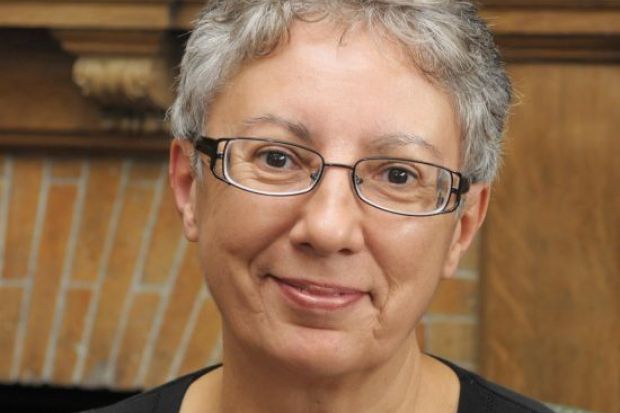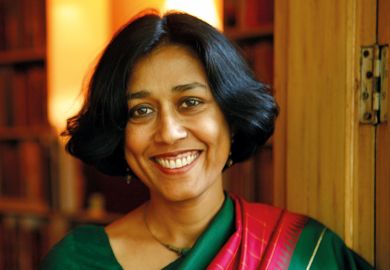Hazel Carby is the Charles C. and Dorothea S. Dilley professor emeritus of African American studies and professor emeritus of American studies at Yale University. She was recently awarded the British Academy’s Nayef Al-Rodhan Prize for Global Cultural Understanding for her book Imperial Intricacies: A Tale of Two Islands, which weaves her family’s past into the history of Britain and Jamaica under the British Empire.
Where and when were you born?
In January 1948, in the house of a distant relative of my mother’s in Devon. My father was an airman based at RAF Waddington [in Lincolnshire]. When he was seconded to take a course in accountancy in south London, my parents were unable to find anyone willing to rent to a black man with a white wife. My mother went to Devon alone in the winter of 1947.
How has this shaped who you are?
My mother was Welsh but grew up in Devon and Somerset, where my grandfather worked as an agricultural labourer. I grew up in London, but he taught me not to be afraid of cows or sheep, and to love walking in the countryside. He taught me to see, appreciate and understand rural environments and ecologies. I think of myself as a Londoner of Jamaican and Welsh ancestry, who is also an avid birder.
What advice would you give to your younger self?
I would tell the teenager to ask her father to talk more about his life in Jamaica. I would tell the child she should tell her mother that she had been raped but I don’t think it would have changed the child’s mind because she thought it was her fault.
What kind of undergraduate were you?
Studious. I had fallen in love with 19th-century English literature in my early teens. But I also learned to be an activist and spent a lot of time outside the American embassy protesting the Vietnam War and was active in the anti-apartheid movement. I learned about state repression from marching in the streets, but I always had a book in my pocket.
What was most memorable about that time?
The innovative curriculum at Portsmouth Polytechnic that incorporated literature, culture, history and sociology was amazing. Professors like John Oakley and Roger Bromley introduced me to cultural and literary theory that broadened my intellectual horizons. They taught me to think critically.
Why did you move from teaching in secondary schools to academia?
I was interested in how racism shaped the British education system, so I pursued a graduate degree at the Institute of Education in 1970, where I was distressed to discover the complete absence of racism in the lectures. The most interesting professor there was Michael Young, author of Knowledge and Control. In 1972, I started teaching at a newly formed comprehensive school in Newham during the time the Greater London Council [GLC] was diverting money and resources from the richest to the poorest areas and we benefited. A team of us developed an innovative, progressive interdisciplinary curriculum. Margaret Thatcher, as education minister, first abolished free school milk and then attacked progressive education policies. What had been built was being destroyed and eventually, of course, Thatcher also abolished the GLC. I had read the work of cultural theorist Stuart Hall and the Centre for Contemporary Cultural Studies at the University of Birmingham. Young gave me the courage to apply.
What was your experience there?
My time at the centre taught me about the importance of collaborative intellectual work. I became part of the race and politics group with Paul Gilroy and others, and we worked on The Empire Strikes Back: Race and Racism in 70s Britain together. In the weekly seminars run by Hall, the deep reading and engagement in Marxist theory and rigorous and passionate debates that took place there lie the roots of my intellectual formation.
Why did you combine personal experiences with academic analysis in Imperial Intricacies?
I wanted to tell a story of how ordinary people are tied to each other across the Atlantic, so examples from my families in Jamaica and the UK became a way to do that. I use the family structure to tell a wider story of empire and imperialism, to ask what we know and do not know about our shared colonial past, and to explore how Britishness harbours the deepest interconnections of class and race and gender.
Why is it so important to examine the legacies of British imperialism?
In the book, I describe when the girl was called a liar by a teacher for telling the class that her father served in the RAF during the war. The teacher announced that coloured people were not British but immigrants who arrived in the UK after the war had been fought and won. Having previously absorbed the fact that she was a “nigger”, a “wog”, “coloured” and “half-caste”, that was the point at which she learned that she was not considered British. I write from the perspective of someone of Jamaican Welsh ancestry who does not take definitions of being British for granted but asks how people come to understand themselves as British, as imperial or colonial subjects; how some came to believe they were white and superior to those who were not. These are still relevant questions. Many forms of historical amnesia remain, disguising the aftermath of colonialism and empire. I wanted to expose them.
What is the best thing about your job?
I have always enjoyed teaching, seeing doors open in the mind of a student when they encounter something for the first time, whether it be a painting or a poem, a work of history or a new concept. Virtual teaching has severe pedagogical limits.
What would you like to be remembered for?
The path-breaking and very important work of my students and for being supportive and encouraging as a teacher and as a mum.
What do you do for fun?
I enjoy exploring art galleries. I love being in our cottage in the Northeast Kingdom of Vermont close to the border on a glacial lake which the entire community works very hard to keep pristine.
anna.mckie@timeshighereducation.com
Appointments
Dava Newman has been named as director of the Media Lab at Massachusetts Institute of Technology. She is currently professor of aeronautics and astronautics at MIT and a faculty member in the Harvard-MIT program in health sciences and technology. She has served as principal investigator on four space missions and as deputy administrator of Nasa from 2015 to 2017. “Leading the legendary Media Lab is a dream for me, and I can’t wait to help write the next chapter of this uniquely creative, impactful, compassionate community,” Professor Newman said.
Cheryl Moore is joining the Wellcome Trust as director of research programmes. She is currently president and chief operating officer of the New York Genome Center. She was previously executive vice-president of the Howard Hughes Medical Institute and founding chief operating officer of the Janelia Research Campus. Sir Jeremy Farrar, Wellcome’s director, said he was “delighted that Cheryl will be joining us to oversee our research programmes…she stood out as a leader with a great breadth and depth of experience in medical research”.
Sir Mark Walport has been appointed chair of the strategic partnership board at Imperial College London’s Academic Health Science Centre. He was previously the chief executive of UK Research and Innovation and chief scientific adviser to the UK government.
Lonnie Williams will become vice-chancellor for diversity and community engagement at Arkansas State University. He previously served as associate vice-chancellor for student affairs.
Iain Stewart will be the inaugural new Jordan-UK El Hassan bin Talal research chair in sustainability, awarded by the Royal Scientific Society of Jordan and the British Academy. He was formerly director of the Sustainable Earth Institute at the University of Plymouth.
Register to continue
Why register?
- Registration is free and only takes a moment
- Once registered, you can read 3 articles a month
- Sign up for our newsletter
Subscribe
Or subscribe for unlimited access to:
- Unlimited access to news, views, insights & reviews
- Digital editions
- Digital access to THE’s university and college rankings analysis
Already registered or a current subscriber? Login








